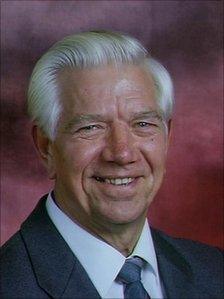Obituary: Lord Ashley
- Published

Champion of the disadvantaged
Jack Ashley was a tireless crusader. For more than 40 years, first as an MP and then a peer he fought for the rights of the underprivileged and the disadvantaged.
His efforts on behalf of the least fortunate in society won him the admiration and support of politicians from all parts of the political spectrum.
Jack Ashley was born in Widnes, Cheshire, on 6 December 1922.
With his father already dead, he left school at 14 to become the family's chief breadwinner as a factory worker and crane driver.
He was soon a leading trade unionist at his workplace in the chemical industry.
Sticking his neck out was nothing new for Jack Ashley. His first political act, aged 18, was to seek out the town clerk of Widnes and enquire about tenants' rights.
Armed with no qualifications, but with an enquiring mind and supreme organisational skills, Ashley was soon on the national executive of his union, and on the strength of this, won a scholarship to Oxford.
From there he went to Cambridge, where he became the first working-class President of the Union and Chairman of the Labour Club. He went to work for the ģÉČËŋėĘÖ before deciding to stand for Parliament.
Mr Ashley entered the House of Commons in 1966, and soon began to make his mark as an irrepressible defender of the afflicted.
But soon after being elected MP for Stoke-on-Trent, he underwent a routine operation to correct a perforated eardrum and suffered a profound loss of hearing, "rather like being struck by lightning".
He prepared to resign his seat, but was persuaded instead to take a crash-course in lip-reading. Several weeks later he was back in the House, said to be the only totally deaf member of parliament in the world.
<bold>'Political animal'</bold>
And his causes were many and varied. Jack Ashley conducted high-profile campaigns on behalf of widows and battered wives, rape victims, disabled and mentally ill people.
He helped pioneer live captioning on television for deaf people.
And, most challengingly, he sought to help the victims of thalidomide.
Campaigning at Downing Street
A dedicated member of Labour and self-professed "political animal", Jack Ashley nevertheless was always prepared to work with other parties for the sake of his causes.
Angered by government handling of the thalidomide scandal, Ashley resigned from his post at the Department of Health and Social Security in protest.
He took on the Army in 1987, saying he had a dossier of bullying incidents that justified an independent investigation. But his claims were dismissed by other Government officials, and he was forced to apologise for what was called "a smear campaign".
It was only after he left the House of Commons that he had some hearing restored after a cochlear implant in 1993.
In recent years he argued for Blue Badges to allow easy parking for people with autism, with his last bill introduced to the House of Lords in 2007, just a week after his 85th birthday.
And he was still involved in high profile campaigning about thalidomide as recently as 2009.
That was the year he stood down from the influential All Party Parliamentary Disablement group, which he had founded and chaired for four decades.
Made a lord in 1992, Jack Ashley always decried his own achievements, saying: "I was simply bringing about changes in the working environment and in the places where people lived. I think mine was a pragmatic approach."
<bold>'Bloody minded'</bold>
Of his many campaigns and successes, he explained that he "just happened to be there".
But his late wife wife Pauline, who died in 2003, said the secret of his success was his bloody mindedness. Once he had taken up a cause, he was the proverbial dog with a bone, and would never give it up.
Labour leader Ed Miliband said: "There are many millions of men and women with disabilities who will have better lives thanks to Jack Ashley."